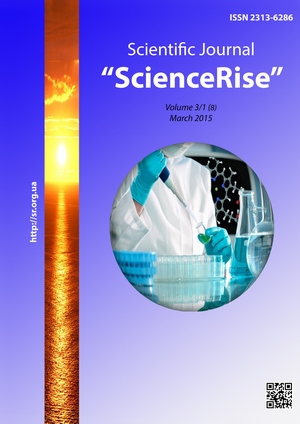Жіноча благодійніть на Полтавщині: з досвіду заснування інституту шляхетних панянок
DOI :
https://doi.org/10.15587/2313-8416.2015.38991Mots-clés :
Варвара Рєпніна, благодійність, жіноча освіта, інститут шляхетних панянок, історичний досвідRésumé
У статті розкрито внесок у розвиток освіти жінок відомої благодійниці початку ХІХ століття, доньки міністра народної освіти, графа Олексія Розумовського, онуки останнього гетьмана Лівобережної України Кирила Розумовського, дружини генерал-губернатора Миколи Рєпніна – княгині Варвари Волконської-Репніної. Показано, що однією із найпопулярніших шкіл для дівчат зазначеного періоду були інститути шляхетних панянок. З цією метою проаналізовано досвід заснування Полтавського інституту шляхетних панянок
Références
Bim-Bad, B. M. (2002) Pedagogical encyclopedic dictionary. Moscow: Great Russian encyclopedia, 528.
Likhachev, E. A. (1899–1901). Materials for the history of women's education in Russia. SPb, 1-4.
Zinchenko, N. E. (1901). Women's education in Russia. Historical sketch. SPb., 46.
Letter to N. I. Pirogov about love, about the responsibilities of mother educators (1914). Russian school, 11, 20–26.
Malinkо, I. G. (1985). Women's Higher education in Ukraine (second half of XIX – beginning of XX centuries). Kharkov, 24.
Volkovа, I. A. (1995). Women's issue in Ukraine (second half of XIX century). Odessa, 24.
Vovk, L. P. (1996). The Genesis of the priority trends of adult education in Ukraine (second half of XIX – 20-ies of XX century). Kiev, 49.
Suhanko, Т. С. (2001). Century. Female secondary education in Ukraine (XIX – beginning of XX centuries). Kiev, 20.
Demyanenko, N. M. (2005). The history of women's higher education in Ukraine: Kiev Ropelewski pedagogical Institute (1907–1920). Kiev: C. D. Golitsyn, 492.
Tronko, Т. С. (2001). The Activities of public authorities in the area of women's secondary education in Dnieper Ukraine in the second half of the ХІХ century. Zaporozhye, 19.
Yershova, L. M. (2002). Development of female education in Volhynia (the end of XVIII – beginning of XX century). Kiev, 20.
Dobrovolskaya, С. А. (2006). The History of women's education in the South of Ukraine (1901–1910). Dnepropetrovsk, 20.
Susara, Т. В. (2006). The Development of female education in Tavria province (XIX – early XX century). Kiev, 20.
Shandra, В. (2006). Century Creating the Imperial elite. Day, 15 Dec.
Mazanov, P. I. (1899). Poltava Institute of noble maidens 1818–1898 Archive help. Poltava, 324.
Mazanov, P. I. (1899). Poltava Institute of noble maidens 1818–1898 Archive help. Poltava, 324.
Kudrytskiy, A. C. (1992). Poltava : Encyclopedic Handbook. Kiev: UE, 1024.
Mazanov, P. I. (1899). Poltava Institute of noble maidens 1818–1898 Archive help. Poltava, 324.
Onishchenko, С., Kocherga, N. (2008). Century From Poltava Institute of noble maidens to the European dimension of higher technical education of Poltava. Evening Poltava, 24 Dec.
Mazanov, P. I. (1899). Poltava Institute of noble maidens 1818 – 1898 Archive help. Poltava, 324.
Onishchenko, С., Kocherga, N. (2008). Century From Poltava Institute of noble maidens to the European dimension of higher technical education of Poltava. Evening Poltava, 24 Dec.
Mazanov, P. I. (1899). Poltava Institute of noble maidens 1818–1898 Archive help. Poltava, 324.
Mazanov, P. I. (1899). Poltava Institute of noble maidens 1818–1898 Archive help. Poltava, 324.
Pavlovsky, I. F. (1914). Poltava: hierarchs, state and public figures and philanthropists. Poltava, 291.
Téléchargements
Publié-e
Numéro
Rubrique
Licence
(c) Tous droits réservés Олена Юріївна Ільченко 2015

Cette œuvre est sous licence Creative Commons Attribution 4.0 International.
Our journal abides by the Creative Commons CC BY copyright rights and permissions for open access journals.
Authors, who are published in this journal, agree to the following conditions:
1. The authors reserve the right to authorship of the work and pass the first publication right of this work to the journal under the terms of a Creative Commons CC BY, which allows others to freely distribute the published research with the obligatory reference to the authors of the original work and the first publication of the work in this journal.
2. The authors have the right to conclude separate supplement agreements that relate to non-exclusive work distribution in the form in which it has been published by the journal (for example, to upload the work to the online storage of the journal or publish it as part of a monograph), provided that the reference to the first publication of the work in this journal is included.

